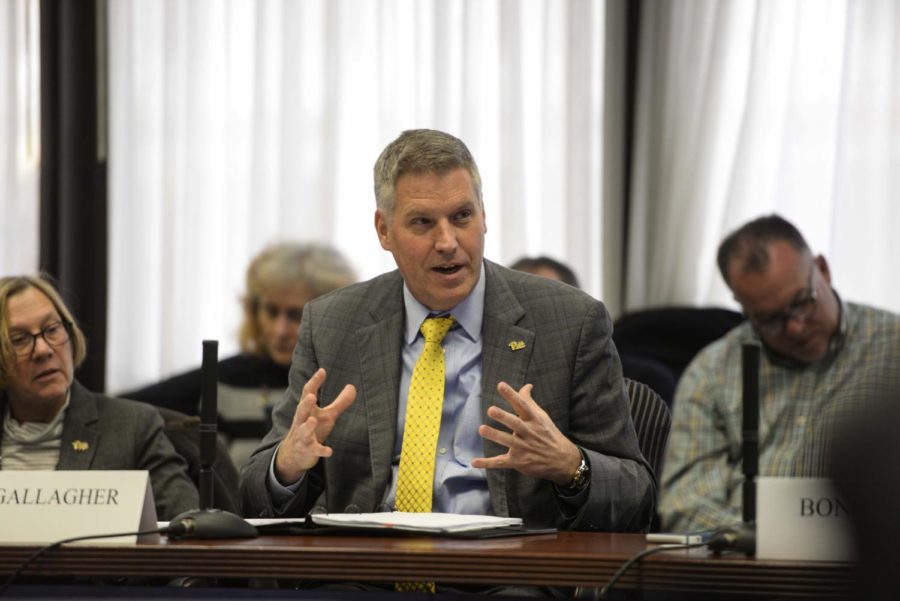University launches interim closure policy for this winter
Pitt announced a new interim policy for severe weather closures on Wednesday. The new policy allows the chancellor to close the University as a result of severe weather with consultation from other administrators.
November 14, 2019
One day after the first significant snowfall on campus, Pitt announced a new interim policy for severe weather closures that includes more University administrators than just the chancellor in the decision to partially or fully cancel classes.
Chancellor Patrick Gallagher said at Wednesday’s Senate Council meeting that a University as large a Pitt has many people to consider before issuing a closing, warranting the creation of a new policy. He referenced a line from the popular “Game of Thrones” television show in his remarks.
“As the saying goes, ‘Winter is coming,’” Gallagher said. “We didn’t want to enter the winter weather season without issuing at least some improvement or guidance from last year.”
Amidst a polar vortex with wind chills as cold as 20 below zero and a petition started by sophomore Taylor Tomlinson with more than 8,500 signatures demanding Pitt cancel classes, the University closed on Jan. 30 last winter.
The Senate Council discussed this updated policy from the Department of Safety and Emergency Management, updates on new initiatives triggered by the AAU Campus Climate Survey and other important campus topics Wednesday afternoon in Posvar Hall.
Pitt’s new weather closure policy, finalized this Monday, allows the chancellor, with consultation from other administrators, to close the University for either a full day or just part of a day. For a full-day closure or a morning partial-day closure, the University will make a decision by 6:00 a.m., or by noon for an afternoon partial-day closure. The former policy permitted the chancellor, with no outside consultation, to make a decision about class cancellation.
Gallagher said the policy is still considered interim because there is not a unified closure policy across all of Pitt’s different schools. The new interim policy gives discretion to each school’s dean for determining the ramifications students face for missing class because of severe weather conditions. The policy has not yet undergone a complete review by the University’s Office of Policy Development and Management, as required.
“I wanted to emphasize it’s an interim policy designed to clarify how we approach decisions. A lot of the guidance is part specific across different programs,” Gallagher said. “It’s labeled interim because there’s a policy group that’s looking to completely review it.”
The Council also discussed revisions to another policy impacting students — how Pitt determines in-state residency status. Tom Hitter, the assistant vice chancellor for policy development, said this revised policy clarifies a financial aid system that many students and parents found confusing.
“The purpose of the policy is to establish the criteria used to classify a student as a Pennsylvania resident and non-resident for tuition purposes,” Hitter said. “[…] according to feedback the University received, the policy, as previously written, was confusing and hard for students to navigate.”
Hitter added that the new policy was meant to better explain existing criteria, rather than introduce new ones.
“A large effort of the rewrite was reorganizing and rewriting it to make it more usable and transparent for students and parents,” Hitter said. “It’s not introducing any new requirements that did not previously exist. It’s only restating it.”
When asked about residency status for students living in Pittsburgh for year-round, Beth Stack, the associate vice chancellor for student financial services, said living in Pennsylvania for a full year does not necessarily mean students meet the requirements for in-state status. They are instead designated by the University as a student studying in Pennsylvania rather than a resident of Pennsylvania.
“Just because a student has resided in the Commonwealth for 12 months, if they are attending school, that means to us they will continue their classification as an out-of-state student,” Stack said. “This is until they stop attending school or their personal circumstances change as they can demonstrate.”
Gallagher also provided an update on Pitt’s ongoing response to the mid-October release of a report by the Association of American Universities detailing sexual misconduct and assault on 33 campuses across the country, including Pitt.
At the time of its release, Gallagher wrote in a campus-wide email that the results of the report show that Pitt’s current efforts to prevent these actions are “insufficient.” He also announced the University would begin a new community-driven response to the problem.
He reiterated at the meeting that the University is making up to $250,000 available for faculty and staff to support “innovative solutions” for preventing sexual misconduct on campus.
While Gallagher said he is looking forward to seeing the community’s ideas for sexual assault prevention, he wants a system designed to assess the success of Pitt’s programs and grants.
“I’m looking forward to seeing what the community comes up with,” Gallagher said. “We want a framework for accountability so we can access our progress without waiting episodically for campus climate surveys.”
Anthony Verardi, a graduate student representative from the Dietrich School of Arts and Sciences, said while he appreciates Pitt’s current efforts, he wants more focus from the University on reducing the number of incidents of sexual assault rather than funding research initiatives.
“My constituents want to make it unequivocally clear that the University’s response findings of the AAU report must go beyond providing support for research initiatives on sexual misconduct,” Verardi said. “Directed messaging outlining concrete intended actions would be welcome.”



